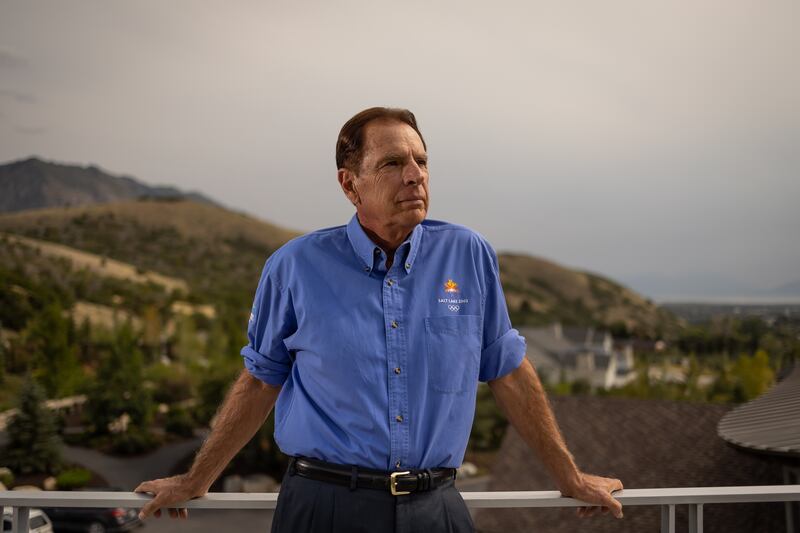In a world where you get everything you want when you want it, Fraser Bullock would be in China right now for the start of the Beijing Olympics, renewing and cementing relationships with his many friends, contacts and colleagues in the Olympic movement while continuing to pave the highway to another Salt Lake Winter Games.
But he’s not there. Last week, with the virus that originated in China flaring again in China, the International Olympic Committee canceled all visits for people from places lobbying for future Olympics. Just as he was packing his bags, Bullock had to unpack them.
Disappointed? Of course. But there is always a bright side. In this case a big one.
Seven years ago, if Bullock and his colleagues had had their way, Beijing wouldn’t be hosting the 2022 Olympics. Salt Lake would.
“We were trying for 2022, but the United States Olympic Committee decided to instead get behind Los Angeles for 2024,” said Bullock.
Los Angeles indeed won the ’24 Olympics, after which the USOC anointed Salt Lake its favored American city status to bid for future Games. In the meantime, Beijing had won the rights to ’22.
“We’re fortunate not to be doing this one,” Fraser said in what amounts to a massive understatement.
But, then, no one needs to tell him about the landmines that can pop up when you’re putting on an Olympics. He was second in command to Mitt Romney on the Salt Lake 2002 Organizing Committee when 9/11 happened only four months before those Olympics were to begin.
“Just when we thought we were in good shape, we had to get back in the trenches and rebuild a lot of stuff,” he remembers, not the least of which was a completely overhauled and upgraded security system. Before 9/11 it was basically some Dobermans at the border. After 9/11 Utah was protected like the president.
As anyone who was there — and that’s still quite a lot of us — remembers, the Salt Lake Games not only went off without a terrorist attack, but with plenty of snow (Beijing, incidentally, is having to use 100% man-made snow — needless to say a first in Winter Olympics history), 17 days of memorable athletic events, no scandal or controversy (if you don’t count figure skating) and the friendliest volunteers the O-Games had ever seen — all tied up at the end with a $100 million profit.
When those 2002 Games were over it was time to let out a huge exhale and move on.
But not for Fraser Bullock.
With Romney off to Massachusetts to run for governor, Bullock — who remained in Utah to resume the career in finance he’d put on hold for three years — first made sure the profit from the Games went into a foundation ensuring the Olympic facilities would be properly maintained.
Then he looked in his email and discovered a lot of people in the Olympic world wanted to pick his brain.
Usually their first question went something like this: “You put on an Olympics and made money?!”
That would be followed with queries about logistics, long-range planning, infrastructure and so forth — the X’s and O’s of staging the 30-ring circus that is the Olympics.
Bullock, being one of the world’s more affable human beings, as well as something of a savant at organizing things and making them successful, was always happy to oblige.
The next Winter Olympics following Salt Lake was in Turin, Italy. When the CEO and chief operating officer were let go (sound familiar?) with less than a year remaining, the IOC called Fraser and essentially said, “Help!” He worked 16-hour days getting things back on track. In 2010 he consulted at Vancouver, in 2014 at Sochi, in 2016 in Rio for the Summer Games.
Over the past 20 years he has volunteered to help out on any number of projects involving the IOC and United States Olympic and Paralympic Committee.
Most recently, he served on an elite IOC committee charged with establishing a “new norm” for the Games.
One of the committee’s recommendations is putting a priority on preserving and utilizing existing venues at places that have previously hosted an Olympics. Another is overhauling the process that determines host cities. Gone are the days of wining, dining and schmoozing IOC delegates for their votes, replaced by a system that objectively identifies the top candidates and buffers the voters from the bidders.
“The process has gone from one of popularity, politics and potential corruption to a very different scenario of a dialogue and a partnership,” he said.
Both of these “new norms” greatly favor Salt Lake’s chances for another Olympics. Indeed, the second one, ironically, owes its roots to Salt Lake’s rather transparent gift-giving for the 2002 Games. Nobody played that game worse than we did.
In Bullock’s view, that was long ago and far away. “Most IOC members who experienced that have moved on. We have a new generation of people leading the Games, and they appreciate what Salt Lake did in 2002 and what we have continued to do.”
With the ’02 venues well preserved, the budget the Salt Lake City-Utah Committee for the Games, of which he is president, proposes for a future Olympics, when adjusted for inflation, is significantly less than the 2002 budget.
Without doubt, if the Games do return to Utah, Fraser Bullock, along with all the well-preserved venues, will be a major reason why.
And as far as he’s concerned, you can cross out the “if.”
“It is absolutely when not if,” he said, “and it’s likely either 2030 or 2034.”
As for the current Olympics, the one China got instead of us, like the rest of us, he’ll be watching it on TV.


